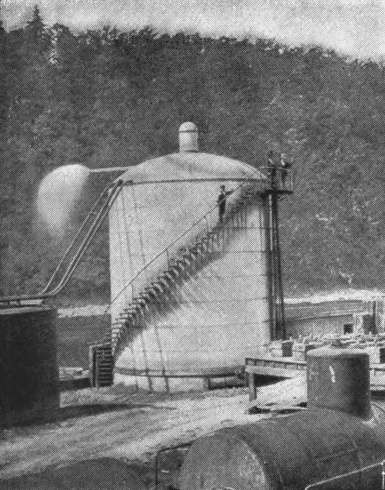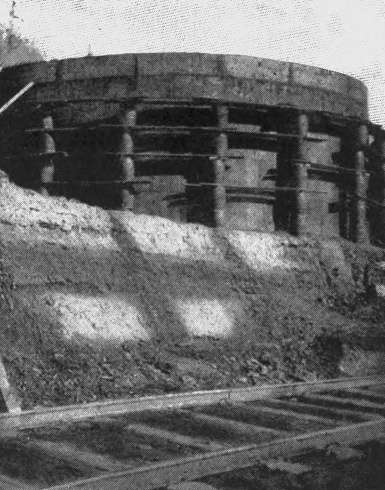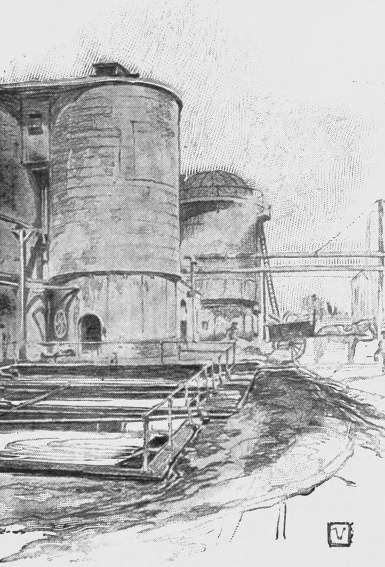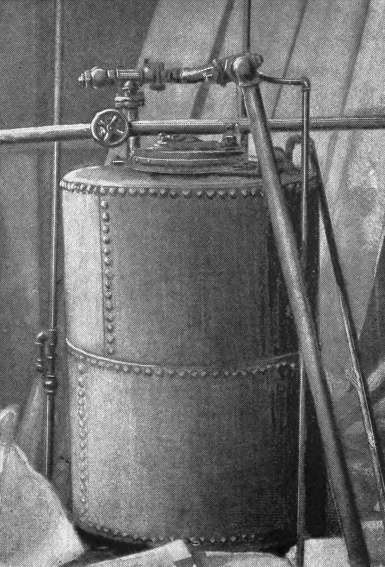

THE STANDARD BUYS THREE-FOURTHS OF THE VACUUM OIL WORKS OF ROCHESTER — TWO VACUUM EMPLOYEES ESTABLISH BUFFALO LUBRICATING OIL COMPANY AND TAKE WITH THEM AN EXPERIENCED STILLMAN FROM THE VACUUM — THE BUFFALO LUBRICATING OIL COMPANY HAS AN EXPLOSION AND THE STILLMAN SUDDENLY LEAVES — THE BUFFALO LUBRICATING OIL COMPANY IS SUED BY VACUUM FOR INFRINGEMENT OF PATENTS — MATTHEWS SUES THE EVERESTS OF THE VACUUM FOR DELIBERATELY TRYING TO RUIN HIS BUSINESS — MATTHEWS WINS HIS FIRST CIVIL SUIT — HE FILES A SECOND SUIT FOR DAMAGES, AND SECURES THE INDICTMENT OF SEVERAL STANDARD OFFICIALS FOR CRIMINAL CONSPIRACY — ROGERS, ARCHBOLD AND McGREGOR ACQUITTED — THE EVERESTS FINED
VERY soon after Mr. Rockefeller began to "acquire" independent refineries, whose owners were loath to sell or go out of business, unpleasant stones began to be circulated in the oil world of the methods used in getting the offending plants out of the way. When freight discriminations, cutting off of crude supply, and price wars in the market failed, other means were tried, and these means included sometimes, it was whispered, the actual destruction of the plants. The only case in which this charge was made which ever came to trial was that of the Buffalo Lubricating Oil Company, Limited. For sake of clearness, a narrative of the case has been drawn from the testimony offered, no statements being admitted which were not brought out in the trials.
It seems that some time in 1879 the owners of the Vacuum Oil Works, of Rochester, New York — H. B. and C. M. Everest, father and son — sold to H. H. Rogers, J. D. Archbold and Ambrose McGregor of the Standard Oil Company, for $200,000, a three-fourths interest in that concern. The purchase was not made for the gentlemen in whose names it appeared, but for the Standard. Thus, when on the witness-stand J. D. Archbold was questioned as to the real ownership of the stock which had been bought in his name, the examiner wanted to know whether the purchasers represented themselves or somebody else.
"Mr. Archbold," he asked, "you made the contract, did you not, with reference to the transfer of the seventy-five shares of the Vacuum Oil Company's stock by the Messrs. Everest?"
A. I bought the seventy-five shares, yes, sir.
| · | · | · | · | · | · | · | · | · |
Q. Whom did you represent in that transaction?
A. I represented the shareholders of the Standard Oil Company.
Q. After this purchase was made did you continue to represent the purchasers in the management of the affairs of the Vacuum Oil Company?
A. I did.
Q. By virtue of power delegated to you, or by virtue of being a member of the board of directors or trustees of the Vacuum?
A. By the virtue of power delegated to me.
Q. By the purchasers?
A. By the purchasers.
The Vacuum manufactured principally lubricating oils used on harness and car wheels. It controlled several valuable patents and had been doing a prosperous business for a number of years. By the terms of the sale in 1879 the Everests remained as managers of the refinery, on a salary of $10,000 a year. They also contracted to enter into no outside oil business for ten years. The business policy of the Vacuum, including the fixing of salaries, was dictated by a board of directors made up of Messrs. Rogers, Archbold, McGregor and the two Everests. The meetings of this board were held at the office of the Standard Oil Company, in New York or in Rochester, as convenient.
So far as can be inferred from the testimony, the works were well managed, the dividends large, and the employees well treated. In 1880 the salesman of the concern, J. Scott Wilson, decided to leave the Vacuum and go into business for himself. The decision seems natural, for until 1878 Mr. Wilson had carried on an independent oil business of one kind or another. He had been a partner in a refinery and understood making oils. He had been a jobber on his own account before going with the Everests, and as such had had a considerable clientele. Wilson told one of his fellow employees, Charles B. Matthews, of his decision, and asked him to go with him. Matthews had been with the Everests about the same length of time as Wilson — some two years. Previous to this engagement he had been a farmer, and his acquaintance with the Vacuum people had come about by his drilling on his farm for oil. Matthews was worth some $20,000, but he had had no experience in oil refining, for his duties at the Vacuum had been mainly looking after outside business — for instance, he had several times gone to New York to consult J. D. Archbold and H. H. Rogers concerning business matters, and particularly concerning patents owned by the Vacuum, of whose validity there was some doubt. For some time Matthews had been dissatisfied with his salary — he had asked for a raise, but had not got it — a fact which probably made him more favourable to Wilson's suggestion.
The two men decided finally to form a company and to build an oil refinery at Buffalo. Wilson said on the witness-stand that he did not want to handle the Vacuum processes in the new works, but to make only the oils with which he was familiar. Matthews, however, had convinced himself that the patents which covered certain of the Vacuum processes and apparatus were invalid, and insisted that they build at least one Vacuum still. The question of what steps the Vacuum might take to stop them was discussed, and according to Wilson's testimony Matthews remarked that he expected they would pay $100,000 or $150,000 to prevent their going into business. Matthews's remark was natural enough, considering the conditions under which outside refiners were forced to do business. It is probable that no man undertook any kind of independent oil business at that time, particularly oil refining, without considering the possibility of being driven to sell.
The new firm needed an experienced stillman accustomed to the Vacuum processes, and early in 1881 they asked one Albert Miller, a stillman in the Vacuum works, to join them. "If we have Miller," they told each other, "we can go to the customers of the Vacuum Oil Company and say to them: 'We have the same process and the same apparatus and the same oils as the Vacuum Oil Company, and we have their former superintendent, Mr. Miller, to manufacture the oils.'" Miller had been with the Everests for several years, having worked his way up from a labourer at two dollars a day to a position where, as stillman, he was paid by the hour, and earned from $1,200 to $1,400 a year. He and his wife had been thrifty, and had several thousand dollars in property. Miller thought there was money in the new venture, and consented to join Wilson and Matthews. The three set about carrying out their plans before they notified their employers of their intention to leave — Miller going so far as to order certain iron castings needed in the construction of their works, made after patterns owned by the Everests. He had these made at the foundry patronised by the Everests. He paid for them himself, and carried them away, presumably giving the impression that they were for his employers.
Early in March Matthews and Miller notified C. M. Everest, who was in charge, his father being in California, that they were going to leave and establish at Buffalo an independent oil refinery. Mr. Everest, surprised out of discretion by the news, told them plainly that although he had nothing against them personally, he should do all in his power to injure the proposed concern. He asked them where they expected to get oil, and they replied that they would get it from the Atlas Refining Company, an independent concern in Buffalo, which had its own pipe-line. "You will wake up some morning and find it is in the Standard," replied Mr. Everest. Apparently Mr. Everest's threat had little influence on the men, for they pushed the building of the works in Buffalo as rapidly as possible. On March 15 they signed an agreement to carry on the proposed business for five years, each man to put in $2,000. A month later the three men, with two relatives of Matthews, organised a stock company the Buffalo Lubricating Oil Company, Limited — with a capital of $40,000.
Although Miller had gone to Buffalo the first of March with Matthews and Wilson, he returned frequently to Rochester to see his family. On several of these visits he saw C. M. Everest, who never failed to ask about the progress of the new concern, and to warn him that the Vacuum Company would never allow it to do business. "Don't you think, Miller," Everest said to him once, "that it would be better for you to leave those men and have $20,000 deposited to your wife's credit than to go to these parties?" Miller affirms that he answered that he had gone with the new firm in good faith, and thought he ought not to leave them.




 |
Table of Contents |  |